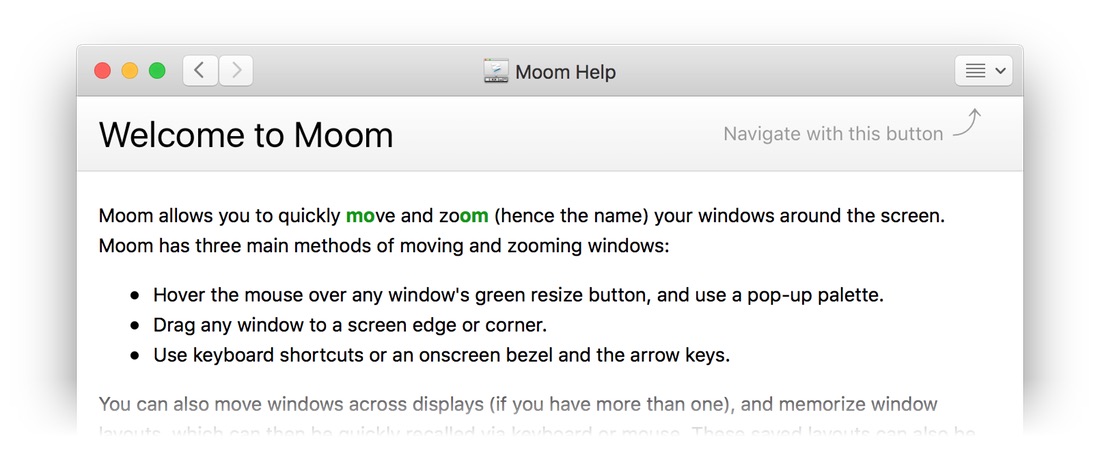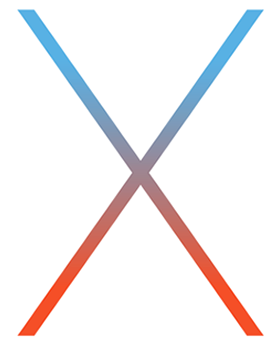All posts in the ‘Butler’ category
Subscribe to the RSS feed for the 'Butler' category
Thursday, April 7th, 2016
Starting with our recent update to Keymo, we rolled out a new help system. We developed this new system to solve some aggravations we were having with Apple’s built-in help system, and to provide our users with a better help experience. This new help system will be rolling out to all our apps in the very near future.
Here’s a quick peek at the first screen of Moom’s new help:

There are many aspects to our new help system that should make in-app help work much better for our users—some new features, some existing features working better, and a revamped look and feel.
(more…)
Posted in Butler, Desktop Curtain, Keymo, Leech, Moom, Name Mangler, Products, Resolutionator, Time Sink, Usher, Witch | Comments Off on Announcing our new in-app help system
Sunday, January 31st, 2016
Yes, that’s right, we’ve updated the updater in our direct apps. Our direct apps rely on Sparkle to inform you when there are new versions available. Over the weekend, we were made aware of a potential vulnerability in how we implemented Sparkle. Basically, if your network is already compromised by what’s called a Man in the Middle attack, then it’s possible an attacker could use the Sparkle update mechanism in our apps to remotely execute code on your Mac. That’s bad.
Although this is a relatively small exposure (as you must already be on a compromised network), we felt it was important to act on it right away, so we’ve updated all of our apps to use Sparkle over secure HTTP (HTTPS). Please update any directly-purchased Many Tricks apps immediately.
Important: There’s a bit of a Catch-22 here … in order to get you this update, it must come over insecure HTTP, because that’s how Sparkle in the app you’re using is configured. If you are concerned that you might be on a compromised network, please do not update using the in-app updater. Instead, just download the relevant app(s) directly from our site, which uses HTTPS.
If you have any questions on this update, please leave a comment or email us directly, and we’ll do our best to address your questions.
Note: Although our App Store apps don’t use Sparkle, we know they’re out of date with some of the other minor bug fixes that came with these releases. We’ll be submitting updates to the App Store next week to get App Store users current.
Posted in Butler, Company News, Desktop Curtain, Key Codes, Keymo, Leech, Moom, Name Mangler, Products, Resolutionator, Time Sink, Witch | Comments Off on All direct apps updated to improve update security
Monday, December 14th, 2015
People ask us all the time, “When are your apps going on sale?” And we always reply “We don’t know,” because, generally, we don’t know. But we know now: Our apps—when you purchase directly from us—are on sale for the remainder of 2015, and there are two ways to take advantage of the sale.
Option One: Own Them All
 First off, you can own them all for just $50—that’s $62 off the normal price of $112 for all 10. All ten apps, fifty bucks total. These are fully licensed versions, not some special one-off, so they’re all eligible for upgrade pricing when major new releases come out.
First off, you can own them all for just $50—that’s $62 off the normal price of $112 for all 10. All ten apps, fifty bucks total. These are fully licensed versions, not some special one-off, so they’re all eligible for upgrade pricing when major new releases come out.
On the charity drive front, we will donate $10 for each bundle sold to the United Nation’s refugee fund, to help with the ongoing global refugee crisis. And to get things started, we’ve already donated $500 to the fund.
Option Two: Save Some Coin
If you don’t really want all our apps (we don’t understand such thinking, of course!), you’ll want to use option two: Every purchase is 30% off for the remainder of the year.
We will donate 10% of our net proceeds from any individual sales to that same UN refugee fund.
About the Mac App Store
You may have noticed that this sale is only available to customers who purchase directly from us; our App Store app pricing is unchanged, and we can’t create a bundle of apps there anyway.
So why aren’t the individual MAS versions on sale? Quite honestly, we feel Apple has ignored the MAS for too long, and as a result, the customer experience is not what it should be. Add in the recent snafu with certificates, and we would like to reward those who choose to purchase direct. That’s why this sale is for direct customers only.
So there you have it, the Many Tricks year-end sale event and charity drive.
Posted in Butler, Company News, Desktop Curtain, Keymo, Leech, Moom, Name Mangler, Products, Resolutionator, Time Sink, Usher, Witch | Comments Off on The Many Tricks holiday sale event and charity drive
Monday, September 28th, 2015
There are a couple of changes in the soon-to-be-released El Capitan that required us to update our direct-sales app update mechanism—an incredible open-source framework known as Sparkle. (App Store versions don’t have this update mechanism, because the App Store app handles app updates.)
Because of how we implemented Sparkle, we found that the updater wasn’t working properly in El Capitan. So we needed to fix this prior to El Capitan’s release. As a result, today we have updated every single direct app we sell (and even one we give away):
Butler, Desktop Curtain, Key Codes, Keymo, Leech, Moom, Name Mangler, Time Sink, Usher, and Witch
We have pushed all these updates live, so you should see them automatically (if you have our apps set to auto-update), or you can look in the Preferences > Updates section of a given app and manually check for updates. You can also download the complete new version from our site, if you prefer (just delete the old one and replace with the new; you won’t lose your settings.)
Posted in Butler, Company News, Desktop Curtain, Key Codes, Keymo, Leech, Moom, Name Mangler, Products, Resolutionator, Time Sink, Usher, Witch | 2 Comments »
Wednesday, June 10th, 2015
 As you surely know by now, Apple announced OS X El Capitan (aka Mac OS X 10.11) this week, with general availability this fall. They also released a developer beta, so we were able to give our suite of apps a quick test on the new system.
As you surely know by now, Apple announced OS X El Capitan (aka Mac OS X 10.11) this week, with general availability this fall. They also released a developer beta, so we were able to give our suite of apps a quick test on the new system.
Given El Capitan’s focus on improving Yosemite, not implementing wholesale changes to the system’s fundamentals, we were hopeful that things would just work.
And that’s what we found: all of our apps appear to work fine. We have not done extensive testing of 100% of the features in 100% of the apps, but they all launch and run, and we tested a number of functions in each app. Even older versions of our apps, such as Name Mangler 2, appear to run fine.
We may have some minor tweaking to do, due to the change in the system font, but the apps themselves are all running under El Capitan. Yes, this includes Butler. Yes, this includes Usher. And Time Sink. And everything else, including Displaperture and the beta Resolutionator. Even our two Safari extensions appear to work.
So if you’re a developer using the preview, or you’re planning on installing the public beta when it’s released, our apps should work as expected. Of course, please let us know if you run into any issues—it’s very difficult for us to test every feature in every app by ourselves.
Posted in Butler, Desktop Curtain, Displaperture, Key Codes, Keymo, Leech, Moom, Name Mangler, Products, Resolutionator, Safari Extensions, Time Sink, Usher, Witch | 12 Comments »
Monday, December 15th, 2014
As promised, today we’re announcing both something new and something different … and the something different is our holiday sale. We’ve tried to keep it as simple as possible:
From now through end-of-day (USA Pacific time) on December 31st, 2014, all of our applications are 50% off—whether you buy them from us or from the App Store.
Note: App Store prices are 50% off, except in cases where the price would wind up on a $.50 split (because the App Store forces all prices to end in $.99). So for those “fifty cent split” apps, the App Store versions of each app will be $0.49 more expensive than buying directly from us.
Also note: Upgrades are not on sale. If you’re an existing user of an old version of one of our apps, just buy the full version at the sale price. It will be cheaper than the upgrade!
Finally note: If you want to save even more, just buy four or more of our apps, and you’ll save another 20%. This deal only works on purchases from our site; the App Store doesn’t allow us to create multi-item discounts.
No coupon code, no secret handshake, no treasure hunt … everything’s just half off for the next couple of weeks.
Gift purchases: If you’d like to give one or more apps as a gift, here’s how to do it:
- Load the Gift Our Apps web page.
- Select which product you’d like to gift, enter the recipient’s name and email address, then click Add to Cart.
- Buy whatever else you want for yourself, or proceed to checkout if it’s just a gift. (To give more than one gift, click Continue Shopping on the pop-up cart window, then change the information on the gift page and click Add to Cart again.)
When you complete your purchase transaction, you’ll receive the usual confirmation about payment, but you’ll also receive license files for the gift recipients. The email will read “Hello [your name]: Here is your license file for [product], made out to:,” followed by the recipient’s name and email address and the rest of the license email (and attached license file, of course).
You can then copy and paste the license file email (make sure you include the attachment, and probably exclude the first line with your name in it) in a new email to the recipient, and they’ll get the gifted app directly from you.
Posted in Butler, Company News, Desktop Curtain, Keymo, Leech, Moom, Name Mangler, Products, Time Sink, Usher, Witch | 3 Comments »
Friday, December 12th, 2014
The holiday season is in full swing, and come Monday (December 15th), we’ll be joining the festivities. How, exactly? Tune in Monday for the full details!
For now, let’s just say that the “something new” will help you with your resolutions in the new year, and the “something different” will directly affect your wallet this holiday season.
In other words, if you’re thinking of buying something from us soon, you may want to wait until Monday to see what we’ve got to say!
Posted in Butler, Company News, Desktop Curtain, Keymo, Leech, Moom, Name Mangler, Products, Time Sink, Usher, Witch | 4 Comments »
Sunday, October 19th, 2014
Now that OS X 10.10 (aka Yosemite) is officially out, here’s a status report on our apps. The short version: they all work fine, with some minor visual oddities here and there.
Primary applications
Our primary apps—Butler, Desktop Curtain, Keymo, Leech, Moom, Name Mangler, Time Sink, Usher, and Witch—are all compatible with Yosemite.
Some of these apps have some cosmetic issues we’ll be addressing via updates in the near future, but they’re relatively minor adjustments. We’re also working on finding a solution for a Yosemite issue that’s affecting some Witch users.
Baubleries and Safari extensions
The following run without any issues: Key Codes, as well as our two Safari extension (⌘-Click Avenger and Unread→Tabs).
We do not recommend the use of Open-With Manager, Safari Guardian, or Service Scrubber on Yosemite (or more generally, any release newer than Mac OS X 10.5).
Displaperture and Menu Bar Tint: Both of these apps need to be re-signed for Yosemite, and we will do so in a future update. Until then, to run them you’ll need to manually allow each to run in the Security & Privacy System Preferences panel—on the General tab.
You can either change the “Allow apps downloaded from” pop-up to Anywhere, or click the button you’ll see that asks you if it’s OK to run the apps, even though they’re from unidentified developers. (You’ll see this button after trying to run the app once.)
Overall, the upgrade to Yosemite should be a fairly painless one for users of any of our applications.
Posted in Butler, Company News, Desktop Curtain, Key Codes, Keymo, Leech, Moom, Name Mangler, Products, Time Sink, Usher, Witch | 23 Comments »
Wednesday, August 6th, 2014
Today, we’re releasing updates to nearly every app in our collection: Butler, Desktop Curtain, Key Codes, Keymo, Leech, Moom, Name Mangler, Time Sink, Usher, and Witch.
Why the massive update day? First off, a few of the apps have some Yosemite appearance changes (any of the apps that have a menu bar icon, for instance)—and we know at least some of you are using the Yosemite preview. So that’s one cause for the massive number of updates. But not the main cause.
The main cause is that Apple is changing the rules for Gatekeeper in the upcoming OS X 10.9.5 (and obviously in Yosemite as well). This change, as discussed on The Mac Observer, could cause many apps (including ours) to warn users about running insecure software. (Our apps are not insecure, but the change in Gatekeper would make it look like they are.)
Because of the unknown release date for 10.9.5, we’ve taken the unusual step of releasing our direct version updates today, before the App Store versions are ready to go. We’ve submitted the App Store updates to Apple, but given the Gatekeeper change and the huge number of apps that need to be reapproved, we don’t know how long approvals will take.
If you’re a direct customer, you can get updates via in-app updating, or by downloading a new version from our web site. Our App Store updates are marked to release automatically, as soon as Apple approves them. As each is approved, we’ll do our best to note it on Twitter, so that you can get the updates as soon as possible.
For full details on any app’s update, go to that app’s page, then click on Release Notes (e.g., Moom’s release notes).
Posted in Butler, Company News, Desktop Curtain, Key Codes, Keymo, Leech, Moom, Name Mangler, Products, Time Sink, Usher, Witch | 2 Comments »
Tuesday, May 13th, 2014
Today we released a minor Butler update, with three small but important bug fixes:
- Keystrokes Smart Items now let you use the current pasteboard via cmd-v keystroke, provided that you add a sufficiently long delay (recommended: 1 second) in front of the cmd-v keystroke.
- Fixed a display glitch where delays in Keystrokes Smart Items weren’t displayed properly.
- Fixed an issue with the Screensaver Smart Item.
You can update within Butler (in the About Butler section of its configuration window), or by downloading the full version from our site.
Posted in Butler, Products | Comments Off on Butler 4.1.17 released
 Many Tricks
Many Tricks


 First off, you can
First off, you can  As you surely know by now, Apple announced
As you surely know by now, Apple announced